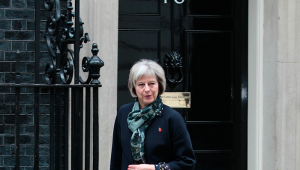‘Labour in La-La-Land’, said the Daily Mail front page on Tuesday. Following the shadow chancellor’s John McDonnell’s conference speech the day before, it was clear that the politics of public finance still loom large. Similarly, at the annual gathering of Conservatives this week, Philip Hammond’s speech will be pored over for any clues on the fiscal reset he has promised for November’s Autumn Statement. Scrutiny will be particularly forensic given the Conservative leadership has committed itself to making the ‘country work for everyone’. But if Theresa May is to have any hope of meeting this aspiration, her government must embrace inclusive growth.
As the Inclusive Growth Commission described in its recent interim report, capitalism isn’t working for large sections of our population. The old assumptions of trickledown economics and rising tides lifting all boats have persistently been shown not to hold true. A new model is needed. Inclusive growth must be at its heart. We must enable as many people as possible to contribute to, and benefit from, economic prosperity.
What would this mean in practice? First, the forthcoming Autumn Statement must recognise that inclusive growth will require more local resources. As a first step, the chancellor should make sure that places are major beneficiaries of any fiscal loosening or re-orientation of public spending. Looking further ahead to the triggering of Article 50, government will also need to plan for how to fill the gap left by European funding. The government needs to commit to filling the investment gap left by the potential loss of European Social Investment Funds and European Investment Bank funding and repatriate funds for combined authorities, councils and local enterprise partnerships to invest in social and economic development.
Second, at a national and local government level we need to address the damaging structural gap between economic and social policy. Unless we are able to bring these two sides of the same coin together – for so long seen and treated as different disciplines, with different cultures, values and principles – we will continue to fail to tackle complex factors underpinning persistent poverty, inequality and productivity challenges in this country. Analysis for the Inclusive Growth Commission by New Economy gives us a sense of the scale of the challenge. If every area in the UK had a gross value added per capita at least as high as the national average, the narrow economic value alone would amount to an extra £191.5bn.
Third, the commission argues that recent efforts to devolve policy making to city-regions and other places gives us an opportunity to integrate economic and social policy at a local level. But it warns that the government must strive for a more ambitious, ‘grown up’ approach to devolution. This will involve moving beyond the binary ‘devolve or centralise’ mentality that has so far characterised the development of the agenda. Grown up devolution blends the best of each, and can support a more tailored, genuinely place-based approach to deal making between the centre and localities. To give places the surety to develop innovative and appropriate approaches to their governance, finance and public service reform arrangements, the commission calls for the UK government to set out a clear process for inclusive devolution. This should be mindful of the current transfer of further powers to the devolved administrations and should include plans for a place-based spending review before the end of the Parliament.
Officials in Treasury seem to be open to ideas for how to take forward the devolution agenda, and to combine it with public service reform and place-sensitive industrial strategies. But what this means for the prospects of local government finance, let alone fiscal devolution, remains unclear. With the business rates retention consultation period now closed, government needs to set out the rules of the game for self-sufficient local government in England, particularly on the issue of equalization. As our politicians know, 2020 will come around all too quick. While the rates review is formally a separate process, it is inextricably bound up with a series of profound questions about austerity and the future of local government finance. Never before has an Autumn Statement seemed so hotly anticipated.
Failure to tackle persistent poverty and inequalities that erode our social and economic productivity will only drag down growth and heighten already mounting pressures on public services. The new government needs to holds its nerve and ensure the principles of economic, social and geographic inclusion are embedded in its plans for public finance.












